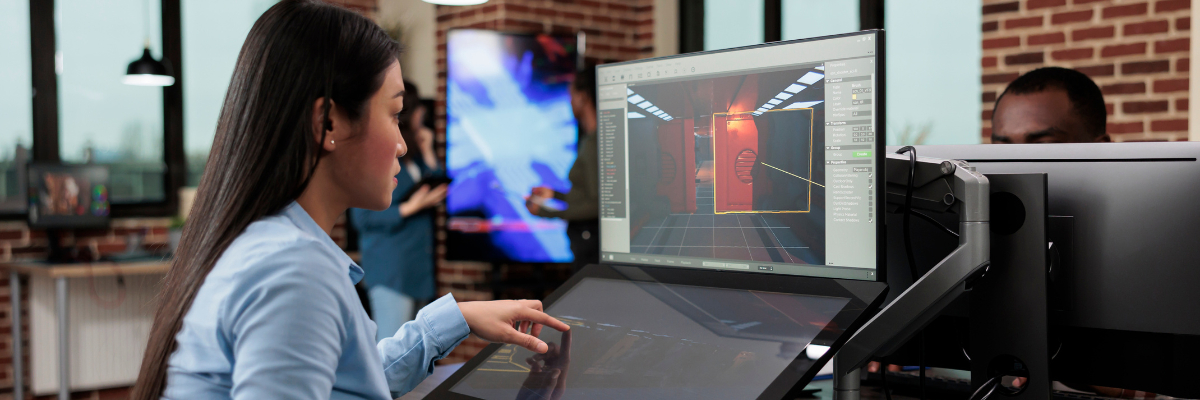The Impact of Neurodivergent Minds in the Gaming Industry
It is difficult to explain the sheer scale of the global gaming industry, with the sector encompassing console gaming, mobile games and e-sports to name just a few of its many key focuses. The global gaming market is expected to be worth over $250b by 2025, with recent data showing that the UK video games industry alone was valued at almost £8b in 2023.
When focusing on the tangible impact of the industry, more than a quarter of UK respondents in one 2023 survey said they gamed for between 1-5 hours per week, while a US survey found 22% of individuals gamed for between 6 and 10 hours each week. With so many people investing time and money into gaming, the industry has the potential to deliver not only great storytelling, but positive messages and diverse characters, to better reflect those who play these games and those in the industry that help make them happen.
It is positive to know that some of the artists who craft these experiences, as with 15-20% of the UK population, are neurodivergent. According to research by The Association for UK Interactive Entertainment (UKIE), 18% of game developers in the UK identify as neurodivergent, demonstrating the large creative influence that neurodivergent talent can have on this sector.
Neurodiversity in Game Development
As part of this blog, we are delving into neurodiversity in game development, and growing neuro-inclusion in this area. Let’s look at some of the gaming companies working to embrace neurodiversity and empower their neurodivergent employees.
In 2023, Ubisoft wrote about the development of their neurodiversity employee resource group, with the aim of supporting neurodivergent individuals within the organisation. They explained that since its inception, the group has grown to over 400 members across 20 countries. In this article they also discussed their neurodiversity talent programme, which the organisation put in place to help foster neuro-inclusion and support neurodivergent individuals so they can maximise their unique strengths and talents.
Another game development company that has been taking steps to make their organisation more neuro-inclusive is Auroch Digital. In a 2022 blog post on neurodiversity in gaming, the company outlined an in-depth plan to support neurodivergent individuals in the industry, including actions organisations can put in place to create inclusive workspaces, and creating a resource centre focused “around neurodiversity in the games industry and how we can all make changes to work better, together.”
In addition to providing examples of practical steps others can take to foster neuro-inclusion, it is great to see them highlight the idea of keeping the conversation around neurodiversity going and the importance of sharing lived experiences. As challenging as it may be for some individuals to open-up about issues they may have faced and the experiences they have had, creating supportive environments where neurodivergent individuals feel safe and supported to have these discussions, can lead to increased understanding from colleagues and friends.
How Gaming Companies Can Embrace Neurodivergent Talent
When it comes to applying for jobs within the gaming industry, neurodivergent individuals may experience challenges that neurotypical individuals don’t, for example, navigating an interview or group task as part of a recruitment process. This may be due to challenges understanding social cues, such as body language and facial expressions, challenges with communicating effectively with others, or challenges with short term memory and organisation, among other areas.
One such example may be asking for extra time to complete written tasks, an area that Microsoft has taken into account when working to make their recruitment process more neuro-inclusive. As a result, the tech organisation have begun using Minecraft: Education Edition to host group tasks as part of their hiring process. This development was put in place by their Inclusive Hiring Team to allow neurodivergent candidates to make the most of skills in areas where they may excel, such as communication, problem-solving and creative thinking in real-time, by setting them challenges they must work in a team to solve.
During this process, candidates can also communicate over text and voice chat, which can be less daunting than face-to-face communication, and which Microsoft have stated can empower candidates to bring their authentic selves to the interview process. I think this is a fascinating and unique way to conduct recruitment and would be interested in finding out more about how it is scored!
It is great to see major organisations making positive progress in creating inclusive environments and supporting neurodivergent talent, however there is still work to do, and one of the biggest ways that businesses can begin a journey to neuro-inclusion is to actively listen to the stories and lived experiences of neurodivergent employees. By developing environments where individuals feel able to have these conversations, we can collectively improve understanding around neurodiversity and the benefits it can bring to the gaming industry and beyond.
How Lexxic Can Support You
To learn about the impact embracing neurodiversity can have on your organisation, Lexxic have created a dedicated guide on Empowering Neurodiversity in the Tech Industry. Click here to find out more and get in touch with one of our team today to see how we can support you.
This blog was written by…



